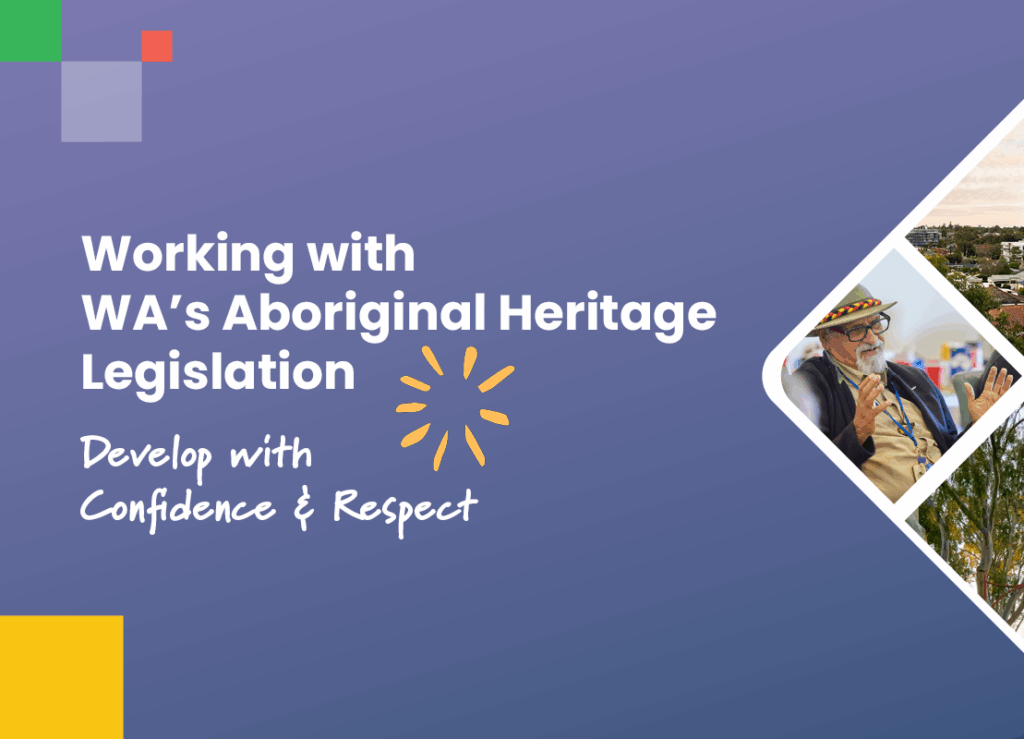Working with WA’s Aboriginal Heritage Legislation
Learning Outcomes
Led by experienced presenters from the WA, the program is designed to increase the understanding of:
- The changes to WA’s Aboriginal Heritage legislative and policy framework and the requirements and implications in an urban development context;
- Landowner obligations, how to comply and considerations for project feasibilities and timeframes;
- How to assess and minimise risk of harm to Aboriginal heritage; and
- How to undertake business and consultations in a sensitive, respectful, and appropriate manner, including how and when to best engage with Aboriginal people during the development process.

Course Summary
Working with WA’s Aboriginal Heritage Legislation focuses on introducing participants to the Aboriginal Heritage Legislation. It covers key areas of knowledge required to understand their responsibilities in managing and protecting Aboriginal Heritage and operating effectively in Western Australia’s urban development industry.
Who should attend?
- Development management professionals
- Planning, environmental and/or heritage professionals
- Other consultants/contractors involved in the planning and design of development projects where there may be an interface with Aboriginal heritage
- Local and State Government representatives working with development approvals
- Others interested in gaining a greater understanding of the legislation and how to effectively engage with Aboriginal people
Course Outline
Welcome to Country and the importance of Aboriginal heritage and its protection.
Introduction to authentic engagement with Aboriginal people
- Requirements under the Aboriginal Heritage legislation
- Identification of native title parties and other Aboriginal people who have knowledge and rights in relation to the Aboriginal site
- When and how best to engage / consult in a respectful, culturally sensitive and effective way
- Mitigating potential harm and negotiating management outcomes
- Case examples of best practice engagement / consultation
Overview of WA’s Aboriginal Heritage Legislation
- What is the Aboriginal Heritage legislative and policy framework and what are the key changes to the Aboriginal Heritage Act 1972 Act?
- What are the key considerations for urban development activities?
- What are the different types of approvals?
- What is the role of the Aboriginal Cultural Heritage Committee?
- Working with the Department of Planning, Lands & Heritage and materials available to assist landowners
Assessing risk of harm to Aboriginal Heritage from urban development projects
- What is an Aboriginal site?
- When and how to determine whether an Aboriginal site may be present, including desktop assessment, heritage survey and consultation requirements under the Act
- Assessing potential for harm to that Aboriginal site, and determining the nature and level of the potential harm
- Case study examples in an urban development context
- What to do if there is a risk of harm to the Aboriginal site
Applying for Section 16 and 18 approvals
- Process, timeframes, fees and charges
- What information must be included in an application and how should it be presented to provide evidence of appropriate due diligence and management plans
- How to submit the application
- Ongoing considerations for landowners following approval
Aboriginal Heritage Surveys, Assessment and Management
- Purpose of heritage surveys/assessments, when they are required and what they cover
- Guidance for conducting surveys and who can do them
- Where to find completed surveys
- State Government Survey program and eligibility to apply for a government funded survey
- Different types of Heritage Management Plans, which tool to use when, and on-ground management solutions
- Case examples in an urban development context
A legal perspective on compliance, risk and dispute resolution
- Legal liability of the landowner, developer and consultants/sub-contractors
- Key considerations and contractual considerations to manage risk for all parties
- Dispute resolution approach and considerations
Interface with other approval processes
- Environmental approvals under the EPA Environmental Factor Guideline – Social Surroundings
- Interface with key planning approval processes
Opportunities to recognise and reflect Aboriginal Heritage in planning and development
- The importance of creating a place narrative through the cultural context process
- Heritage responsive design considerations through engagement with traditional owners
- Case study examples of best practice cultural heritage integration into built form and land development
CPD Points
Attendance to this course attracts 6 REBA CPD Points. To claim these points please send your license type and number to events@udiawa.com.au no later than 2 weeks post course.
Pricing
To obtain member rates please use your company email when registering. All prices are inclusive of GST.
Member: $840
Non-Member: $1,100




